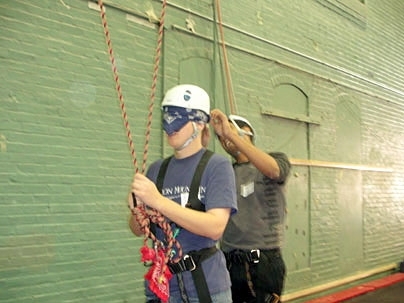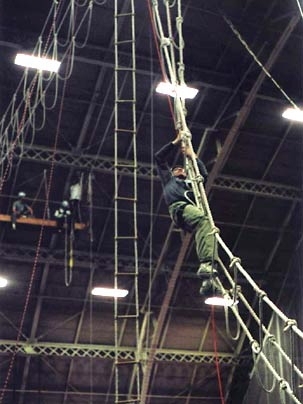Think climbing up a 25-foot rock wall is easy? Try doing it blindfolded!
Sloan students got a chance to try just that during a course called "Obstacles, High Ropes, Leadership and Teams" offered during the Sloan Innovation Period (SIP). The course gives students a mental and physical workout--and dramatically demonstrates the value both of precise instructions and of listening carefully. Although each climber is harnessed and tethered to someone standing on the ground, one missed step can leave a student dangling 20 feet in the air.
SIP was created three years ago to give M.B.A. students the opportunity to hone their leadership skills and take advantage of research workshops halfway through each semester. The MIT Leadership Center works with M.B.A. Student Affairs and MIT Sloan faculty every year to create new offerings. This year's courses, held Oct. 23-27, included "Bosnian Peacekeeping Force," "Leadership as Acting" and "Jamuna Bridge." Students learn from senior executives, build skills and reflect.
Ben Zander, conductor of the Boston Philharmonic, was one of this year's guest lecturers. His students were treated to a two-hour-plus presentation called "Leadership and the Art of Possibility."
An animated speaker, Zander acted out the three responses a person can have toward a dilemma--slumping his shoulders, making a fist and then throwing his hands in the air. "There is no problem that cannot be solved if you make a new framework for it," he said. "And the next time you make a mistake, don't complain, but shout out: 'How fantastic!' You will never learn anything in life unless you make mistakes."
Zander's father, who fled Germany during the Holocaust, never complained about his struggles or tragic background, Zander said. If the weather was bad, his father would say, "There is no such thing as bad weather--only inappropriate clothing." On his deathbed, his final words to one of his sons were, "What can I do for you?"
Zander's message? The secret of life is attitude.
He augmented his talk with several piano bits and a cello performance by one of his New England Conservatory students. The session ended with students singing Beethoven's "Ode to Joy."
There was also joy in the ropes class. Carrie Sampson Moore and Tim Moore not only helped students overcome a fear of heights, they helped them build communication skills.
At the beginning of the seminar, students worked together to build trust by falling backward into each other's arms. They also learned how to use the climbing equipment and got a few safety tips.
As they progressed, the students were able to scale a rope ladder and cross a rope bridge. And as each participant conquered the hardest part of a task, fellow classmates applauded. Everyone shared in the joy.
A version of this article appeared in MIT Tech Talk on November 15, 2006 (download PDF).







